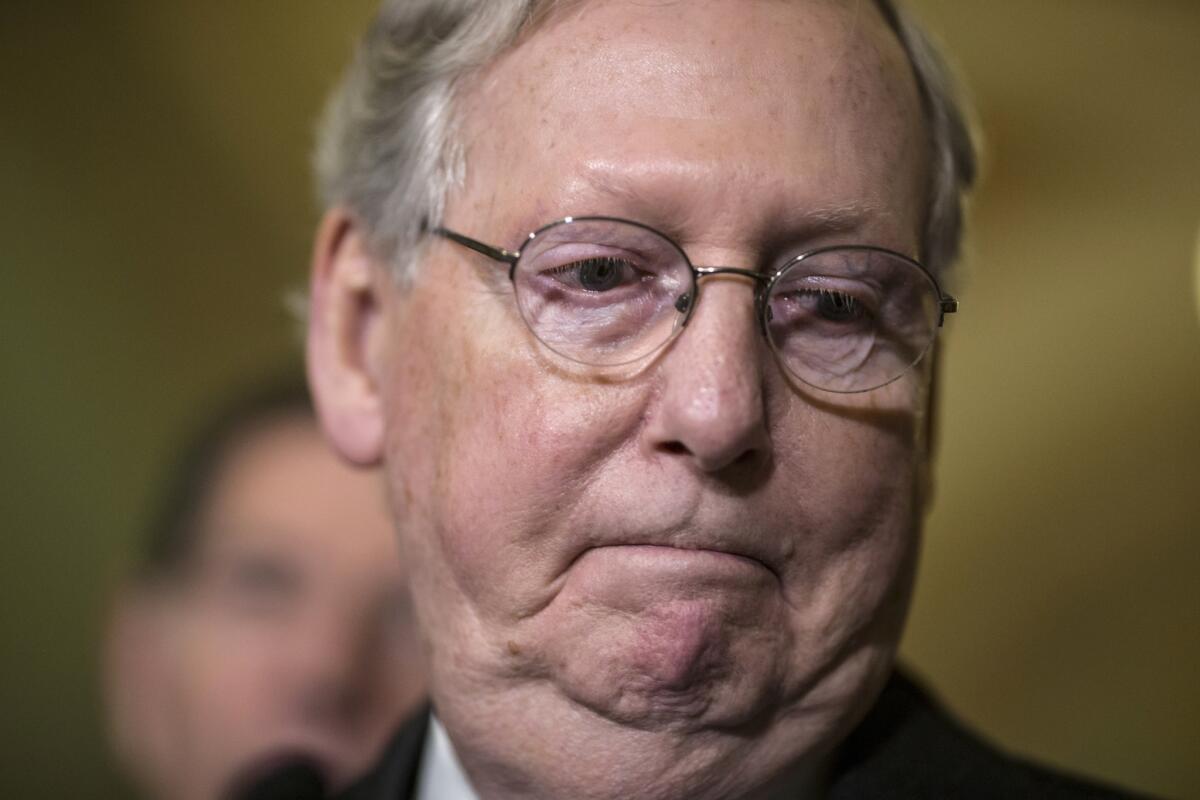Editorial: The GOP wall of Supreme Court nomination obstruction is showing cracks

Senate Majority Leader Mitch McConnell finishes a news conference at the Capitol in Washington, D.C. on Jan. 12.
- Share via
Within hours of the death of Supreme Court Justice Antonin Scalia, Senate Majority Leader Mitch McConnell disgracefully and cynically erected what seemed to be a solid wall to prevent President Obama from selecting Scalia’s replacement. But this week, cracks began to appear in that wall.
Despite McConnell’s assertion that the next president should get to fill the vacancy, some Republican senators have indicated that they might be open to hearings on an Obama nominee — a scenario Senate Judiciary Committee Chairman Charles Grassley refused to rule out — and others said they might be willing to hold a vote. Meanwhile, retired Justice Sandra Day O’Connor — a Ronald Reagan appointee who was a Republican politician before she ascended the bench — said unequivocally that Obama should make a nomination. “We need somebody in there to do the job and just get on with it,” O’Connor added.
We hope the wall will continue to crumble. Continued defiance by the Republicans is not only counter to the letter and spirit of the U.S. Constitution, but it would harm the court in two ways. The obvious short-term harm inflicted by delay would be to deny the court the full complement of justices necessary to resolve important legal issues, creating the possibility of 4-4 votes that would resolve particular cases but not set national precedents. But a prolonged vacancy caused by partisan obstruction would also hurt the court more deeply by reinforcing the impression that the justices are politicians in robes.
Earlier this month, Chief Justice John G. Roberts told an audience in Boston that he and his colleagues “don’t work as Democrats or Republicans.” But assurances like that will lose all credibility if a well-qualified nominee is denied fair consideration just because he or she is nominated by a Democratic president and the Senate is controlled by Republicans. The notion that Republicans are justified in failing to consider an Obama nominee just because the president is in his last year of office is laughable.
Nor is Republican rejectionism justified by the fact that Senate Democrats in the past have blocked or failed to act on qualified judicial nominees chosen by Republican presidents. In truth, both parties in the Senate have engaged in what has become the political equivalent of the war between the Hatfields and the McCoys, but this blood feud hurts the courts and shames the Senate. It has to end at some point. Why not now?
Barack Obama, as a senator from Illinois, voted against [then-candidate John] Roberts and participated in an attempt to filibuster the nomination of Samuel A. Alito Jr.
Some would argue that, despite Roberts’ assurances, the Supreme Court is in fact a political body and that the replacement of Scalia by a Democratic appointee would jeopardize decisions they hold dear, such as Citizens United and rulings upholding an individual right to keep and bear arms. Similarly, some Democrats concerned about a threat to precedents they supported — notably the Roe vs. Wade ruling legalizing abortion — have opposed Republican nominees in the past, including Roberts, because they wouldn’t make it clear that they would respect those decisions.
For instance, Barack Obama, as a senator from Illinois, voted against Roberts and participated in an attempt to filibuster the nomination of Samuel A. Alito Jr., who was nevertheless confirmed.
Obama now frets that judicial confirmations have become “just one more extension of politics,” and says that the standard that should govern judicial nominations — including the one he plans to make to replace Scalia — is that “you make sure that a well-qualified candidate is able to join the bench, even if you don’t particularly agree with them.” That’s not what he did for Roberts and Alito, but it is correct nevertheless.
Obama recognizes, of course, that some nominees with whom he shares a general legal philosophy will be more acceptable to a Republican-controlled Senate than others. Although Obama wouldn’t commit to nominating a “moderate,” Vice President Joe Biden said this week that the president was unlikely to pick “the most liberal jurist in the nation and put them on the court.”
McConnell’s wall of opposition should collapse under the weight of its unreasonableness. Obama can help the process along by putting forward a nominee whose integrity, intelligence and judicial temperament will make it hard for Republicans to vote no.
What do you think? Weigh in on Facebook >>
Follow the Opinion section on Twitter @latimesopinion and Facebook
More to Read
A cure for the common opinion
Get thought-provoking perspectives with our weekly newsletter.
You may occasionally receive promotional content from the Los Angeles Times.






